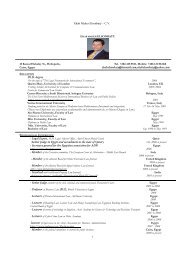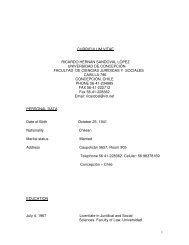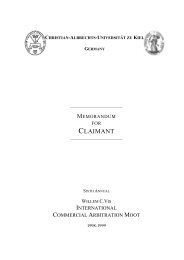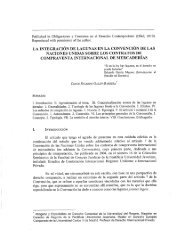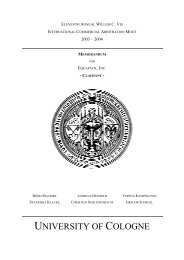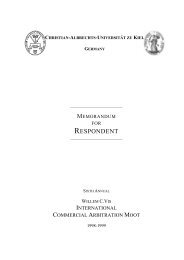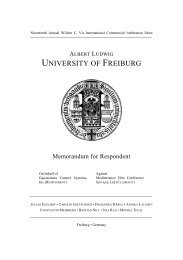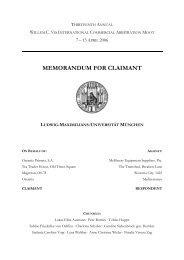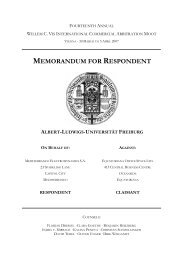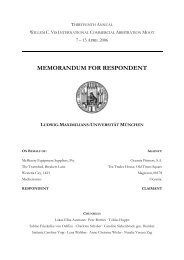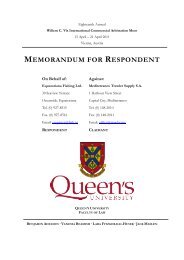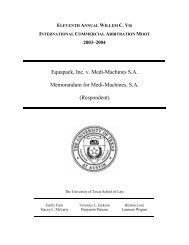CLAIMANT 0800 FINAL 12072006
CLAIMANT 0800 FINAL 12072006
CLAIMANT 0800 FINAL 12072006
You also want an ePaper? Increase the reach of your titles
YUMPU automatically turns print PDFs into web optimized ePapers that Google loves.
amps, the fuse melts, breaking the circuit and preventing the power surge from damaging the rest of<br />
the circuit and any connected equipment [id.]. Putting an 800 amp fuse, for example, in a circuit<br />
designed for 100 amps, would allow currents of up to 800 amps to pass through. Such overcurrents<br />
could cause equipment damage, fires, blackouts, and severe monetary losses, if not injury or death<br />
[Lohbeck; Bussmann 1]. It was because of such risks that Equalec adopted its Fuse Policy in July 2003,<br />
requiring JP fuses in circuits rated less than 400 amps [Cl. Ex. 2; Cl. Ex. 3]. Respondent’s delivery<br />
of Fuse Boards with JS rather than JP fuses was far from a “minor change;” it implied substantial<br />
safety and economic risks in breach of the Contract.<br />
3. Respondent failed to deliver fuse boards lockable to Equalec requirements.<br />
46. Even if Respondent was not obligated to deliver Chat JP fuses, the Fuse Boards still had to be<br />
lockable in the manner that Equalec required per Art. 8 CISG (a). Respondent was bound to<br />
observe Equalec’s connection requirements in so far as they were pre-requisites for Equalec to lock<br />
the Fuse Boards (b).<br />
a. The Contract required fuse boards lockable to Equalec requirements.<br />
47. The Contract required the Fuse Boards “[t]o be lockable to Equalec requirements” [Statement of Claim<br />
7]. Respondent was bound to observe the notes on the Drawings under both Art. 8(1) and Art.<br />
8(2) CISG (see supra 36). In particular, a reasonable party in Respondent’s position would have<br />
understood Claimant’s intent to incorporate Equalec’s requirements under Art. 8(2) for several<br />
reasons. Respondent had significant skill and experience in fabricating custom fuse boards (see supra<br />
40), multiple dealings with clients in Equatoriana [Re. Ex. 1], and demonstrated familiarity with<br />
electrical supply requirements, such as its knowledge of the Commission and certification [Re. Ex.<br />
1]. Respondent was also bound by a trade usage it either knew or should have been aware of as part<br />
of the electrical industry. As the electricity provider in Mountain View, Equalec had managerial<br />
control over the Fuse Boards, even though Claimant purchased and installed them [Statement of Claim<br />
7]. The normal procedure was for Equalec to lock such fuse boards with a small padlock so that it<br />
has exclusive access [Statement of Claim 8]. Such procedures are typical in the industry, especially<br />
given the economic, safety, and liability risks involved [Electric Utility Week]. Contrary to<br />
Respondent’s assertion [Answer 25(d)], Equalec’s requirements were then readily known to<br />
Respondent and integral to its contractual obligations (see also infra 49-50).<br />
48. Respondent was obliged to meet Equalec requirements despite the fact that Equalec's policies only<br />
apply in Equatoriana. If a seller has been informed of the country in which the goods will be used,<br />
18



